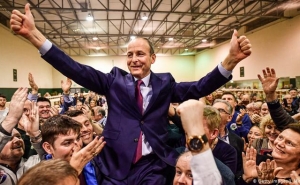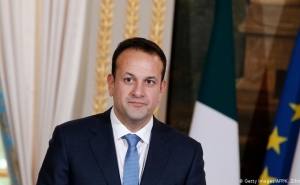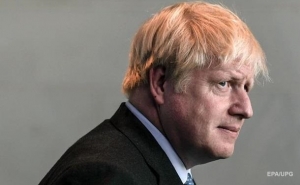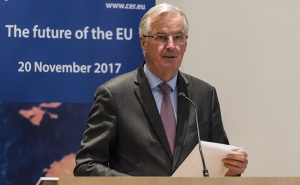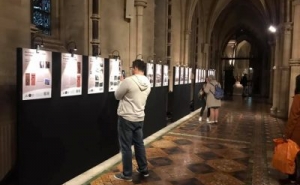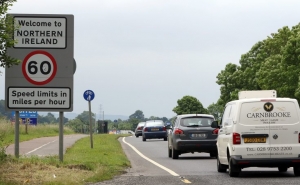Jeffrey Donaldson: We Should Challenge the Idea that We Have to Live in the Conflict All the Time

“Armedia" IAA presents an exclusive interview with a Northern Irish politician and Member of Parliament belonging to the Democratic Unionist Party, Rt. Hon. Jeffrey Donaldson. The interview was taken in the framework of the workshop "The Complexity of Peace Processes: Lessons from Northern Ireland and Scotland Cases" held in Yerevan on September 25-28*.
- What are your impressions from the workshop in general?
- We have come to Armenia to share our experience from Northern Ireland peace process. We recognize that every conflict is different and a solution to each conflict is different, too. So we are not here to suggest that the solutions and answers we have found to our conflict can be easily applied to the situation with Nagorno-Karabakh conflict. However, we think that there are lessons that can be drawn from Northern Ireland peace process. We have done a lot of work in other parts of the world in sharing our experience and I welcome the opportunity to come to Yerevan and to share that experience with very influential people involved in the peace process.
- During one of your presentations you made the thesis according to which conflict is destructing for all conflicting sides. What do conflicting parties need to come to this understanding?
- When conflict lasts for many years it is debilitating, it causes a lot of problems for the societies living in conflict. In Northern Ireland our conflict had been going on for thirty years. And I suppose people got adjusted to the conflict as they thought it was the way it was going to be. Consequently, they had very low expectations of finding a solution. So one of the first ways that the government did was to run an advertising campaign on the television to challenge the idea that we have to live in the conflict all the time. Every conflict is a breakdown in human relationships and the people who take part in the conflict are human beings, they have their own families. The combatants who have been directly involved in a conflict for many years have lost so much they could do with their families.
In conflict it is also important how you prepare for negotiations. If you are not well prepared, it diminishes your chance of successful negotiations. So part of what we are doing here in Yerevan is to share our experience of how we prepared for the negotiations. We are here to share what were the key decisions that we had to make in advance and of how we conducted actual negotiation process.
- You have mentioned about advertising campaign organized by the government. I would like you to elaborate more on the concrete messages of that campaign.
- The research undertaken by the government suggested that one of the strongest influences on the combatants, on the people directly involved in the armed groups, was their families. You could see this when the family of combatants came to visit them in prison, how influential that relationship was.
So government as a part of their advertising campaign ran an advert which was about a terrorist and his relationship with his son (how the son looked at his father and how he was influenced by his father’s involvement in terrorism). Later the son grew up, he himself was involved in terrorism and was killed. And the advert portrayed the grief of the father who realized that it was his influence that made his son get involved in violence and it was his influence that ultimately was responsible for his son’s death. And the advert was asking: Was it worth this? What are we gaining by doing this except losing people, destroying our own families?
The research showed that those adverts were very powerful, very influential in bringing the leadership of the armed groups to the realization that conflict can go on for many more years and very little would be achieved.
- It is often mentioned that human right organizations should have greater influence in conflicting situations. However, in case of non-recognized states, because of non-recognition people often are devoid of receiving humanitarian aid. What should be done to overcome this problem?
- I think that the role of civil society is very important in peace process. Political leaders alone cannot bring peace; you have to build peace from the ground up. International community can do more to build peace, they can invest in civil society, and they can provide support for civil society organizations.
If there is criticism of human right abuses, the international community of course has a role to play in monitoring human right abuses, but it is better when that monitoring is done by locally based organizations; the ones that know the situation on the ground.
So you should have a combination of strong civil society making positive contribution to peace building from ground up, and also international community assisting the peace process and supporting the development of strong civil society.
- For conflict resolution it is important that governments of conflicting parties prepare their societies for peace. However we often have cases when one side prepares its societies for peace while another does not. Here we deal with the problem of unequal asymmetry. Don't you think that it is impossible to always have a unilateral process?
- You are absolutely right. It is very important that both sides in a conflict prepare their societies for peace agreement, because it will require compromises on both sides. You need to meet public expectations and the leader is good as far as he manages to bring people with him.
Very often peace processes fail only because leaders are not able to take their people with them. There are many examples of this across the world. So if one side is not preparing its people for agreement that damages the prospect of successful outcome. It undermines the prospect of peaceful outcome. If you are not preparing your people for peace agreement that necessarily involves compromise, there is stronger possibility that people will reject the agreement.
It is important for leaders to lead, to negotiate and to build peace at the high level, but they also should work with civil society to prepare for the prospect of a peace agreement.
- How is the work with society interconnected with the behavior of the sides around the negotiation table?
It is a fine balance between, on the one hand working to prepare your people for a compromise and on the other hand not being seen as a weak negotiator. If your opponent thinks you are weak negotiator, he will exploit that weakness. So you have to work hard at being strong in negotiations, and at the same time also preparing your people for the possibility of compromise.
I think this is where Track 2 approach can be helpful, because a leader around a negotiating table has to be strong and talk about his/her top line, but compromises are required on that top line to reach what we call bottom line, absolute, essential components of an agreement. Will you agree with that on negotiation table on public? Probably not.
That is why mediated dialogue of even bilateral private dialogue is central component of every negotiating process because it helps each side to understand what compromises are required. As a negotiator I need to know what I require, but I also need to know what my opponent requires from me because at the end, for an agreement to be reached we need to help each other.
*The opinions expressed in the interview do not necessarily represent the position of the British government.
*The workshop was conducted by Marttii Ahtisaari Centre (CMI) together with its partner NGO European Integration (EI). The workshop was supported by the British Embassy in Yerevan in the framework of the United Kingdom Conflict, Security and Stability Fund.
-
 17:08
17:08The regular session of the Anti-corruption Policy Council takes place in Jermuk
-
 15:05
15:05The Prime Minister sends congratulatory messages to the supreme leader of Iran and the President of Iran
-
 11:11
11:11Armenia sends earthquake aid to Turkey
-
 10:43
10:43Commemoration of the Pontiff St. Sahak Partev
-
 09:16
09:16Some roads are closed and difficult to pass in Armenia
-
 19:55
19:55Phone conversation of the Foreign Minister of Armenia with the U.S. Assistant Secretary of State for European and Eurasian Affairs
-
 18:30
18:30Prime Minister Pashinyan and President Khachaturyan meet
-
 18:20
18:20Ararat Mirzoyan with Co-Chairman of the OSCE Minsk Group of France Brice Roquefeuil
-
 17:01
17:01Humans could land on Mars within 10 years, Musk predicts
-
 16:45
16:45France, US urge 'immediate' end to Nagorno Karabakh blockade
-
 16:01
16:01Blockaded Nagorno Karabakh launches fundraiser to support quake-hit Syria
-
 15:59
15:59Earthquake death toll in Turkey rises to 18,342
-
 15:43
15:43Ararat Mirzoyan Held a Telephone Conversation with Sergey Lavrov
-
 15:06
15:06French president rules out fighter jet supplies to Ukraine in near future
-
 14:47
14:475 Day Weather Forecast in Armenia
-
 14:44
14:44President Vahagn Khachaturyan wrote a note in the book of condolences opened in the Embassy of Syria in Armenia
-
 14:20
14:20Azerbaijan’s provocations impede establishment of peace and stability – Armenian FM tells Russian Co-Chair of OSCE MG
-
 12:57
12:57France representation to OSCE: Paris calls on Azerbaijan to restore freedom of movement through Lachin corridor
-
 11:40
11:40Command of Kosovo forces highly appreciated preparation of Armenian peacekeepers
-
 10:16
10:16The United States withdrew from sanctions against Syria for six months the provision of assistance after the earthquake
day
week
month
Humidity: 26%
Wind: 2.06 km/h


